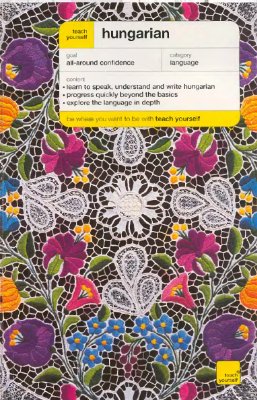Pontifex Zs. Teach Yourself Hungarian. – Ldn. : Mcgraw-Hill , 2003.
– 376p.
This is a practical course designed for the absolute beginner who might not have studied any languages before and who wishes to communicate in everyday, straightforward situations when going to Hungary. You will lea, for example, how to give information about yourself and ask for
similar information about other people, how to order a meal at a restaurant, how to ask your way in the street, how to express your likes or dislikes, agreement or disagreement, how to apologize, accept or refuse invitations and so on. The course will also provide you with some background information about Hungary and the Hungarians so that you can get more out of your visit.
Let us say you are going on a short holiday or business trip to Hungary. You want to acquire a small amount of Hungarian at a very simple level in order to make your visit more rewarding. For this, it is enough for you to study Part One. It will acquaint you with the basic vocabulary and grammar that you will need to be able to 'survive' in straightforward situations. After working your way through the five units of Part One you should be able to make up simple sentences of your own. You will find the additional vocabulary you might need in the relevant units of Part Two. (The key vocabulary is listed in a box after each dialogue or exercise. )
Part Two is for students who wish to acquire more than just a 'survival' knowledge of the language. It builds on the language skills acquired in Part One. By the end of the course you will have mastered enough knowledge of both the spoken and the written language to be able to deal with most everyday situations.
This is a practical course designed for the absolute beginner who might not have studied any languages before and who wishes to communicate in everyday, straightforward situations when going to Hungary. You will lea, for example, how to give information about yourself and ask for
similar information about other people, how to order a meal at a restaurant, how to ask your way in the street, how to express your likes or dislikes, agreement or disagreement, how to apologize, accept or refuse invitations and so on. The course will also provide you with some background information about Hungary and the Hungarians so that you can get more out of your visit.
Let us say you are going on a short holiday or business trip to Hungary. You want to acquire a small amount of Hungarian at a very simple level in order to make your visit more rewarding. For this, it is enough for you to study Part One. It will acquaint you with the basic vocabulary and grammar that you will need to be able to 'survive' in straightforward situations. After working your way through the five units of Part One you should be able to make up simple sentences of your own. You will find the additional vocabulary you might need in the relevant units of Part Two. (The key vocabulary is listed in a box after each dialogue or exercise. )
Part Two is for students who wish to acquire more than just a 'survival' knowledge of the language. It builds on the language skills acquired in Part One. By the end of the course you will have mastered enough knowledge of both the spoken and the written language to be able to deal with most everyday situations.

